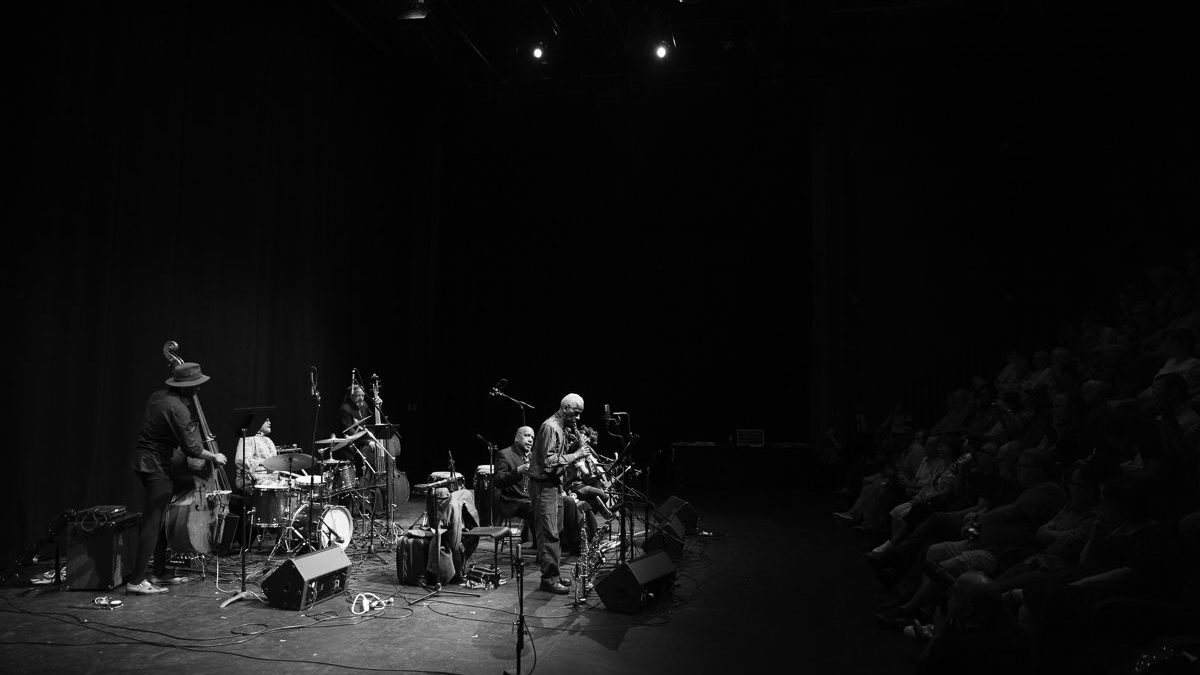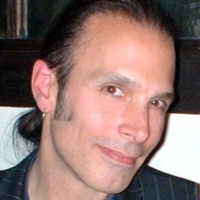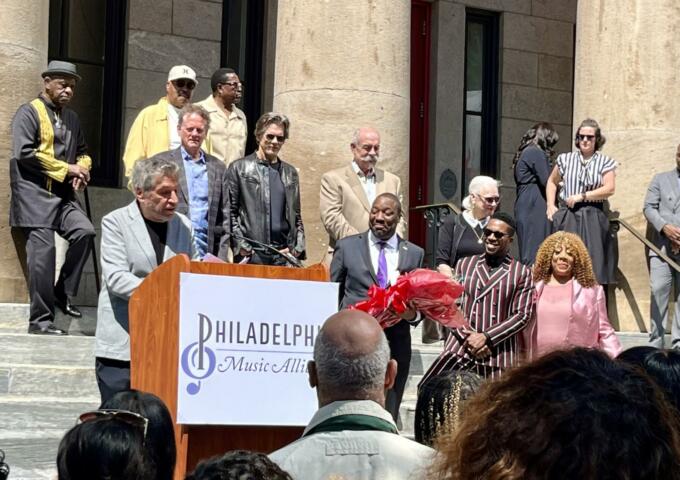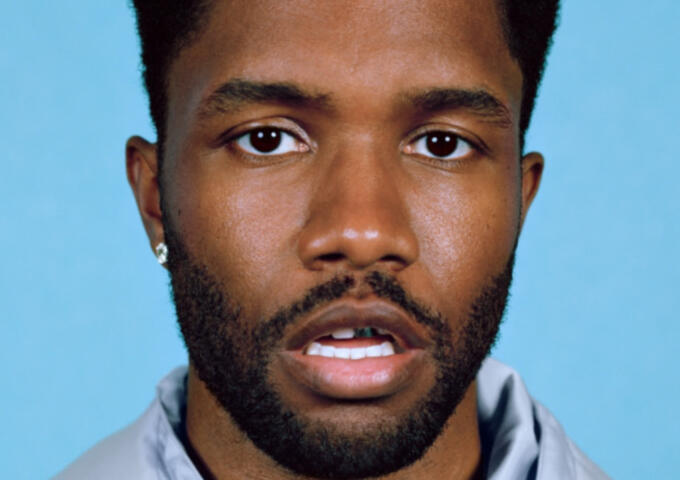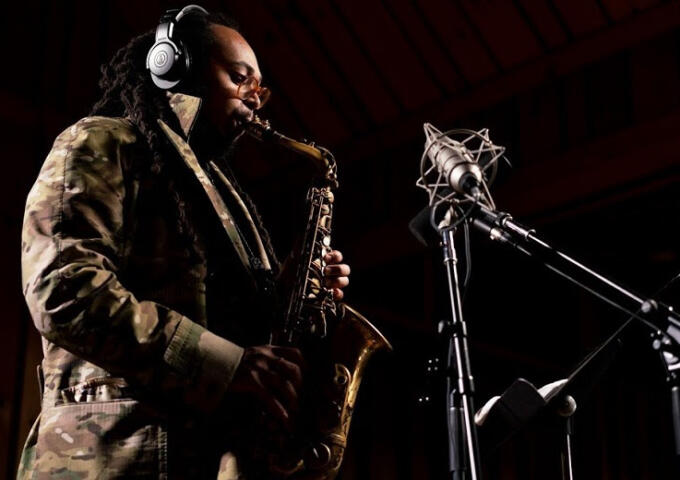Moor Mother is Afrofuturism at its best.
She can be viewed through the lens of her hardcore poetry with books such as “Fetish Bones,” or through her protest music with albums such as “The Motionless Present.”
Notable even still is Moor Mother’s (who was born with the name Camae Ayewa) activist work fighting gentrification in North Philly and the subjugation of women worldwide.
Having this dynamic, local, experimental solo artist join the ranks of the Art Ensemble of Chicago is akin to Childish Gambino joining Public Enemy – one young legend of bomb-dropping expressionism joining the ones that came before. That’s what happens this week with the Art Ensemble’s new album, “We Are on the Edge.” The work is a celebration of the group’s 50th anniversary, its “ancient to the future” motto and its ancestral roots, and its legacy will now include Moor Mother’s words and vocals.
“The interconnectedness of these musicians is inspiring,” said Ars Nova Workshop CEO Mark Christman, whose inaugural “October Revolution” festival presented both artists as its bookends. “They meet, come together, create, move on and loop back around to meet again.”
Along with touring with the Art Ensemble and its reeds man, Roscoe Mitchell, Moor Mother is preparing for an exhibition at the Center for Emerging Visual Artists (CFEVA) in May. In June, she’ll unveil her first theatrical presentation, a choreographed poem called “Circuit City,” June 20-23 for FringeArts.
Why did you decide to become Moor Mother, rather than use your real name for your music?
I needed a new name for solo art projects and came up with Moor Mother to honor mothers, and to honor blackness before racial classifications as we know them now, before the 1700s.
The name does not represent a persona. Is there, however, something that Moor Mother can do that Camae can’t or won’t?
Camae is more based on my literary work when I’m releasing books or writing for publications. I want to keep Moor Mother for sound-based projects.
Would you say that your poetry is more dedicated to activism than your activism is dedicated to poetry?
I think the poetry wins out.
Everything that you write about – the underrepresented, the non-included, systemic racism – are these topics that you must include and infuse through all your work for it to feel whole? Is it an organic part of your writing process that these things come into play or do you conjure them?
I just write and hope that all of those things fall into the boxes they need to fall into.
Is Philadelphia more of a character in your lyrics or a dynamic backdrop?
I think the friends I’ve been able to make here, the fact this city is not so big a music city, that it’s filled with go-getters when you put the proper fire under them – like me – that’s the backdrop.
Alice Coltrane, Nina Simone, Billie Holiday, Betty Carter – these are your biggest inspirations, yes? How do you carry on the music and traditions of your foremothers in a way that is radically different from anything they have done or said?
I don’t know if it’s so radically different. I know because when I tour, internationally, people from that older generation give me respect, and that I represent that level of freeness. I just happened to come up in punk and never studied the music, so it gives me a raw edge. I’m more carrying on the tradition than reinventing the wheel.
I think you’re being modest. What did Art Ensemble of Chicago’s Roscoe Mitchell – someone of that generation – know or think of your music when you met?
We met in Latvia at an experimental jazz festival. His niece told him about me, and when I asked if he would be so kind as to come to my set, he said he had already planned to.
Mitchell is a quietly intense, intelligent and passionate man when it comes to sound. What was your initial conversation?
I was just respectful. When he told me he thought my set was good, I was like ‘woah.’ I gave him my poetry book and gave him my address, and he made up a package of his CDs and sent them to me. We stayed in contact, and when I was in London, he asked me about getting involved with this record he was making with the Art Ensemble. He said he wanted me for one specific track and that I could freestyle over another one. After he sent me some tracks, I was all over that.
Can you give me a picture of recording “We’re on the Edge” with them? How did it come together in your head?
I was so busy between a residency and a tour that I didn’t really have a chance to work on it until I was in the studio with them. Soon as I heard it I [started] getting emotional. If all that connects when you just listen to something, it’s easy for me. Improv poetry. I was nervous as the whole band was there in the studio, but I did the poem once – I tend to write poetry with space so that I can add stuff between the words. The reason why I like Alice Coltrane is because of her story, her struggle and perseverance. Being interested in that, I could tap into what the Art Ensemble has been through for 50 years. That’s what makes me good as a poet, that I could feel.
Here they are, celebrating 50 years together, and with you. Were you, like me, all about the AACM and all things Art Ensemble growing up?
I really knew more about Mitchell and his solo recordings than I did the music of the whole band. Once I played a show with him, I started diving in. I had the Art Ensemble’s ‘Fanfare for the Warriors’ record on my phone, and couldn’t get it off, but also had all of Mitchell’s solo stuff there too. It’s opened my eyes to so much more.
Are you now part of the Art Ensemble’s extended family, one whose lineage includes the late great Lester Bowie and Don Moye?
At first, I was like ‘Hey, am I in the band?’ I’m too shy, though, to say it out loud. I’m just taking this ride, you know. Now, I’m doing all these shows with them, and with Roscoe solo, I am part of the family. They’re so cool, they’re like uncles. They’re including me without saying such.
What can you say about this Circuit City musical you have coming to FringeArts? They call it a choreo-poem.
It’s a free jazz musical. I mean, yeah, the only reason I ever want to write plays, period, is because of Nztoake Shange, Amiri Baraka and Sonia Sanchez. They were artists and poets before they were playwrights. Through their poetry, I found their plays. I wasn’t writing my poetry and then just one day go ‘oh, this cool’ and decided to add a play in there. FringeArts found out I was writing one, and they asked me to put it on.
Having interviewed all three, I can state that they thought of themselves as poets first. In your play, are there roles beyond your own?
Not really. It’s all me. It’s all my feelings. If you listen to my band Irresistible Entanglements or any of my albums, you’ll recognize my themes. In the play, they’re living in affordable housing. I’ve always rapped about affordable housing. It reminds me of doing these durations that I perform, some of which are 14 hours long. You’re pushing yourself a little bit farther each time. It’s a lot of work, these plays.
––
“I just write and hope that…things fall into the boxes they need to fall into.”
– Poet, actor and activist Moor Mother
––
Is the music from the play your next album?
I have one new album coming out this autumn and I’m recording this show – part improv, all electronic music – and it will be another new album.
Musically and in regards to your instrumentation and arrangements, your stuff is as ‘ancient to the future’ as the Art Ensemble motto goes. It’s electro-modern primitivism? Do you feel a piece with that? Is the music coming through your head at the same time as the words?
The words lead it. I didn’t realize that they did so, so much, until I went back into the studio with Irreversible Entanglements. It wasn’t easy at first until I lead with the words. Suddenly it fell into place. The band keeps telling me that yes, I’m a poet, but that I’m also a horn player. I’m speaking, and it’s my voice, but it’s an instrument that can be so many instruments. Betty Carter taught me that. How Roscoe Mitchell plays teaches me that. He can play the most beautiful line, then turn around, and play the most challenging thing that you have to work to get on. Every time I play with the Art Ensemble, I get smarter. It’s about taking yourself further with unknown sounds. I don’t’ know what’s coming next, but if I stay within the feeling, I’ll be all right. It’s good to know I can keep pushing farther.
Whether as a solo artist or with Art Ensemble, you’re using hardware made and maintained by yourself. How do you use technology to its fullest?
I have my own thing. I call it ‘liberation technology.’ To me, that’s like Alice Coltrane playing the sitar. Yeah, she’s playing an instrument everyone knows, but she’s playing it in a way unlike anyone else. In my music, I always have blues, gospel and jazz, as they are massive in moving minds and hearts. It’s a technology that frees and inspires people. It frees me.
TWITTER: @ADAMOROSI
